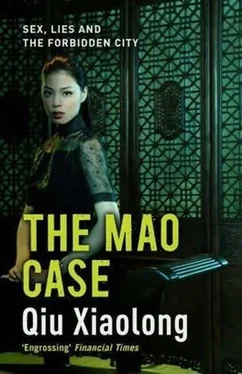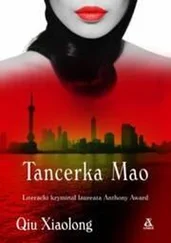It was then that Old Hunter’s cell phone rang. It was Chen. Without saying anything about his vacation, Chen went straight to the suspicious involvement of the special team from Beijing at the beginning of the Cultural Revolution. Among other things, Chen mentioned Shang’s passion for taking photographs, some of which might still be around, and Shang’s maid. It was a hurried call; Chen sounded guarded, as if nervous that the call was being tapped. He didn’t divulge the source of the information and hung up before Old Hunter had time to ask any questions.
Still, Old Hunter managed to copy down the number from Beijing. It was not Chen’s usual one. The phone call was clearly a tip on a direction Chen wanted him to follow here in Shanghai.
Regarding the special team, Old Hunter had used up all his connections making inquiries, but got nothing. They came to Shanghai such a long time ago, and in such a secretive way.
As for Shang’s pictures, he had also drawn a blank. It was trendy nowadays to collect old photographs – not just of Shang, but of other celebrities as well. whatever the case, he had no luck in finding pictures of or by Shang.
So the only thing for him to do was to approach the maid. Possibly the same old woman who had visited Jiao in her apartment here.
Consulting the Yellow Pages, he lost no time getting in touch with the orphanage. According to the secretary who answered the phone, there were records that people had visited Jiao years earlier, but there was no name or address of the visitor recorded.
Still, it could have been Shang’s maid. In Suzhou opera, there were stories about such loyal, self-sacrificing maids.
After several more phone calls, he managed to acquire some basic information about the maid, who was surnamed Zhong and now in her eighties. Instead of going back to the countryside after leaving Shang’s house hold, Zhong had stayed on in the city, alone, eking out a living on the “minimum allowance” of her registered city residence.
Old Hunter put the small envelope of tea leaves back into his pocket. The owner of the hot-water house still remained behind the partition wall, indulging himself with a popular TV soap opera. For five cents per thermos bottle, the business was just an excuse to keep the place registered as business property – which would mean more generous compensation in the event of its being torn down for a new housing project. Lunch time was over and no one would pop in until dinnertime, when provincial workers might purchase hot water for their cold rice.
Throwing ten cents on the table, Old Hunter left for a visit to Zhong.
He had to take two buses before getting off at a stop close to Sanguantang Bridge, which spanned the darksome water of Suzhou Creek. Zhong lived in Putou District, an area mixed with old slums, new skyscrapers, and ongoing concrete and steel constructions.
Was Zhong going to tell him anything? He wasn’t going to approach her as a cop, as someone with authority, who could make her talk. He slowed down, thinking, in the small clearing under the beginning curve of the bridge, perhaps only about a couple of minutes away from the lane she lived in. He lit a cigarette.
In a convenience store by the lane entrance, he bought a plastic bag of dried lychee. The end of the small lane brought him to an ancient two-story building. The black-painted door opened in to a narrow corridor littered with coal briquette stoves and bamboo baskets, and to a dark staircase leading up to an attic room. He fumbled for a while without finding a switch. So he groped up the stairs in the dark, the staircase creaking precariously underfoot, until he reached the top.
The door opened without waiting for his knock. An old woman presented herself in the doorway, probably in her eighties, short and shrunk. In the light streaming down from the attic window, she looked like an ancient peasant woman from a backward village, wearing a gray towel around her hair and a string of Buddhist beads at her neck, and twirling a shorter string of beads in her right hand. Still, she appeared to be quite alert for her age.
“What do you want with me?” she said, showing a frown on her deep-lined forehead.
“Oh, you must be Auntie Zhong. I’m Old Yu,” he started with a rehearsed story. “Please forgive me for taking the liberty to visit you. For an old retiree like me, I have only one wish unfulfilled in this mundane world.”
“What’s that?”
“I’m a loyal fan of Shang, having watched every one of her movies, but I haven’t seen a real-life photograph of hers. You were blessed to have been with her for so many years, Auntie Zhong. I wonder if you could show me or sell me some of her pictures.”
“She had so many fans. But what difference did it make in her last days?” She stepped back, however, making a vague gesture to let him in the pigeon coop – like attic room. “Now, after so many years, you come out of nowhere, asking for her pictures.”
“Now listen to me, Auntie Zhong. I knew nothing about her troubles at the time. Later on, I searched for her pictures everywhere, but without success. It was only yesterday that somebody told me about your relationship to her, and about her passion for photographs. So I thought she might have left some to you as souveniers.”
“No, Mr. Yu.”
“If you don’t have any pictures, would you be able to tell me where I can find them?”
“Why can’t you leave an old woman in peace? I already have one foot dangling in the coffin. And have mercy on Shang, leave her in peace too.”
“It’s more than twenty years since her death, but not a day passes by that I don’t have her in mind. A matchless pearl with her beauty radiating from her soul. These new movie stars nowadays are mud-covered hens compared to a graceful phoenix like her.” He declared, lifting the plastic bag, “I’m an ordinary retiree. This is just a token of my heart-felt gratitude to you, for all the help you have given her and her family. You’re the one sending a cart of charcoal to her in the dreadful winter.”
“Oh, I’m only an ignorant, illiterate woman,” she said. “I was nothing until Shang took me to Shanghai.”
“Please tell me something about her.”
“I was with Shang, then with Qian, and finally with Jiao too,” she said, appearing to be softening, taking the plastic bag. “Things are gone and past like the drifting smoke, like the passing cloud. What can I really tell you? At the beginning of the Cultural Revolution, I had to leave her. Otherwise, she could have been charged with another crime – the crime of bourgeois life style.”
“Yes, that was so considerate of you.”
“She was so pitiable. She hung on to a last straw of hope that the guiren would come to her rescue.”
“Can you be more specific about that guiren, Auntie Zhong?” Guiren – an unexpected luck-bringer – was another word often heard in Suzhou opera.
“He didn’t come,” she said, sniffling. “Nobody came. She gave herself over to despair. Kalpa.”
In Suzhou opera, kalpa meant predestined disasters. He noticed a Buddha statue standing on the only table in the room, with a bronze incense burner in front of the statue.
“Kalpa or not!” he said. “People should have helped. Was there not a single one?”
“No, not a single one,” she said. “If the guiren chose not to do so, who else could?”
He understood the reason why she kept using the term guiren. They both knew who they were talking about. “Back to my earlier questions, did she show you her pictures?”
“Some of them.”
“Including those with the guiren?”
“I don’t remember exactly.”
“Yes, it’s such a long time ago,” he said, taking it as not a downright denial. “After her tragic death, did any of those pictures come to light?”
Читать дальше












